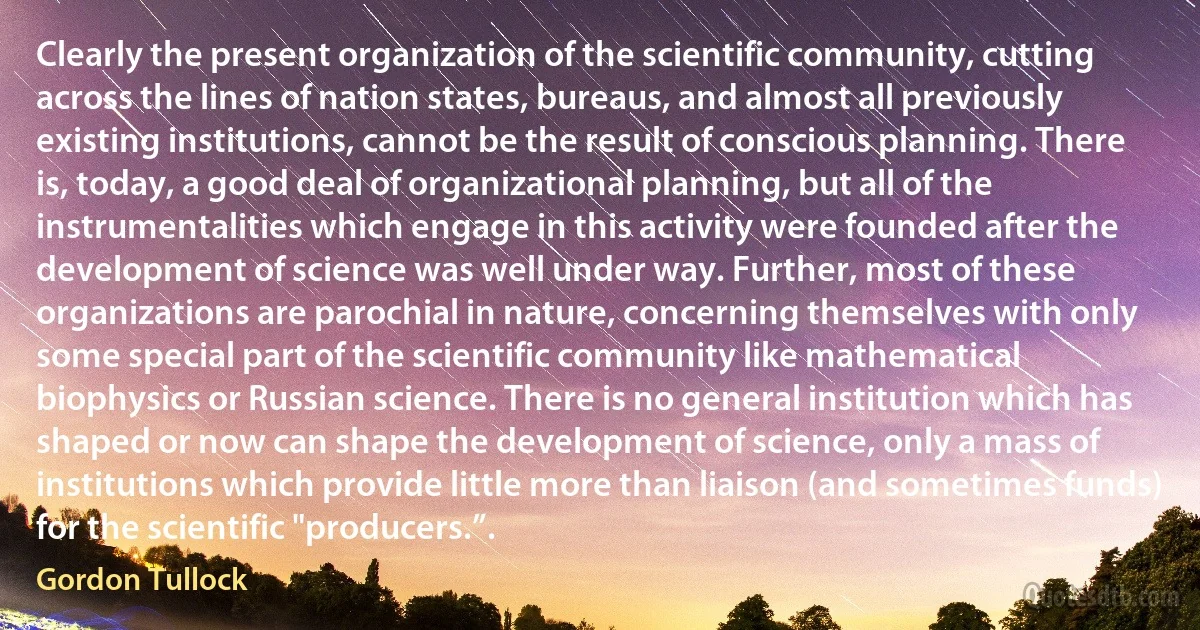
Clearly the present organization of the scientific community, cutting across the lines of nation states, bureaus, and almost all previously existing institutions, cannot be the result of conscious planning. There is, today, a good deal of organizational planning, but all of the instrumentalities which engage in this activity were founded after the development of science was well under way. Further, most of these organizations are parochial in nature, concerning themselves with only some special part of the scientific community like mathematical biophysics or Russian science. There is no general institution which has shaped or now can shape the development of science, only a mass of institutions which provide little more than liaison (and sometimes funds) for the scientific "producers.”.
Gordon TullockRelated topics
across almost cutting deal development general good institution mass nation nature now organization parochial planning present result science under way well today funds statesRelated quotes
It would be helpful if a plan could be adopted which, while retaining the practice of systematic collective bargaining with conciliation voluntary arbitration of labor differences, could also provide simplicity in relations and more direct local responsibility of employees and managers. But such legislation will not meet the requirements of the situation unless it recognizes the principle that t e public has a right to the uninterrupted service of transportation, and therefore a right to be heard when there is danger that the Nation may suffer great injury through the interruption of operations because of labor disputes. If these elements are not comprehended in proposed legislation, it would be better to gain further experience with the present organization for dealing with these questions before undertaking a change.

Calvin Coolidge
Scientific investigation is rapidly putting at our disposal vast amounts of knowledge concerning materials and forces, which it is the business of the engineer to utilize for the benefit of the community. Well-designed plants and efficiency labor-saving devices, to be seen on every hand, bear testimony that he is doing at least a portion of his work well. When, however, it comes to the operation of these plants and the utilization of these labor-saving devices, the lack of co-operation between employer and employee, and the inefficient utilization of labor, very much impair their efficiency. The increase of this efficiency is essentially the problem of the manager, and the amount to which it can be increased by proper study is, in most cases, so great as to be almost incredible.

Henry Gantt
The simultaneousness of states of mind in the work of art: that is the intoxicating aim of our art... In the pictorial description of the various states of mind of a leave-taking, perpendicular lines, undulating lines and as it were worn out, clinging here and there to silhouettes of empty bodies, may well express languidness and discouragement. Confused and trepidating lines, either straight or curved, mingled with the outlined hurried gestures of people calling to one another will express a sensation of chaotic excitement. On the other hand, horizontal lines, fleeting, rapid and jerky, brutally cutting in half lost profiles of faces or crumbling and rebounding fragments of landscape, will give the tumultuous feelings of the person going away.

Umberto Boccioni
General systems theory, in a sense, is no news at all, as Von Foerster found out when he attempted to organize a conference of general systems people and anthropologists. In a sense, the situation is comparable to that found by the Committee for the Study of Mankind, in which a committee that included Robert Redfidd tried to get each discipline to consider its relationship to the concept of Mankind. Anthropologists replied, "we are related already," and so they were. Something similar may be said of attempts to date in mathematical anthropology. The kind of information that a computer program can finally provide, on a level of a particular culture, is simply a reflection of how detailed field work has been done, and to the careful field worker, on kinship, for example, it provides no illumination.

Margaret Mead
The third and intermediate kind of instruction, which connects the first two... relates to the application of scientific principles to practical purposes. It qualifies the student to plan a structure or a machine for a given purpose, without the necessity of copying some existing example, and to adapt his designs to situations to which no existing example affords a parallel. It enables him to compute the theoretical limit of the strength or stability of a structure, or the efficiency of a machine of a particular kind-to ascertain how far an actual structure or machine fails to attain that limit-to discover the cause of such shortcomings-and to devise improvements for obviating such causes; and it enables him to judge how far an established practical rule is founded on reason, how far on mere custom, and how far on error.

William John Macquorn Rankine
